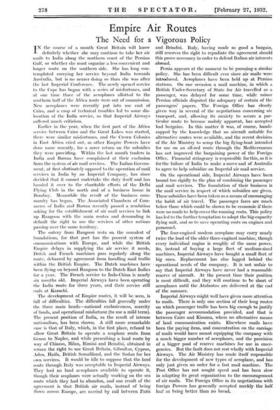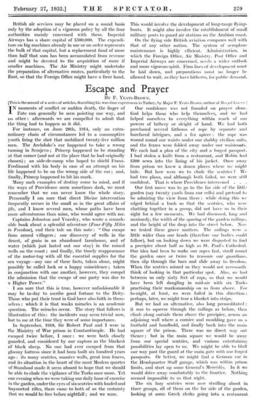Empire Air Routes
The Need for a Vigorous Policy
IN the course of a month Great Britain will know definitely whether she may continue to take her air mails to India along the northern coast of the Persian Gulf, or whether she must organize a less convenient and longer route on the southern side. She has long con- templated carrying her service beyond India towards Australia, but is no nearer doing so than she was after the last Imperial Conference. The newly opened service to the Cape has begun with a series of misfortunes, and at one time three of the aeroplanes allotted to the southern half of the Africa route were out of commission. New aeroplanes were recently put into use cast of Cairo, and a crop of technical troubles -led to some dis- location of the India service, so that Imperial Airways suffered much -criticism.
Earlier in the- year, when the first part of the Africa service between Cairo and the Great Lakes was started, there were similar misfortunes, and the Crown Colonies in East Africa cried out, as other Empire Powers have done more recently, for a surer return on the subsidies they were -providing. Within the last month traders in India and Burma have complained at their exclusion from the system of air mail services. The Indian Govern- ment, at first obstinately opposed to the operation of mail services in India by an Imperial Company, has since decided that it cannot undertake the duty itself and has handed it over to the charitable efforts of the Delhi Flying Club in the north and of a business house in Bombay. Meanwhile the revolt of the business com- munity has begun. The Associated Chambers of Com- merce of India and Burma recently passed a resolution asking for the establishment of air mail services to link up Rangoon with the main routes and demanding in default the right to use the services of other nations passing over the same territory.
The outcry from Rangoon rests on the soundest of foundations, for that port has the poorest system of communications with Europe, and while the British Empire delays in supplying the air service it needs, Dutch and French machines pass regularly along the route, debarred by agreement from handling mail traffic within the British Empire. The Dutch machines have been flying on beyond Rangoon to the Dutch East Indies for a year. The French service to Indo-China is nearly six months old. Imperial Airways have been operating the India route for three years, and their service still ends at Karachi.
The development of Empire routes, it will be seen, is full of difficulties. The difficulties fall generally under the three main heads—national exclusiveness, scarcity of funds, and operational misfortune (to use a mild term). The present _position of India, as the result of intense nationalism, has been shown. A still more remarkable ease is that of Italy, which, in the first place, refused to allow Great Britain to operate a seaplane route from Genoa to Naples, and while prescribing a land route by way of Chiasso, Milan, Rimini and Brindisi, obtained in return the right to use Great Britain, Gibraltar, Cyprus, Aden, Haifa, British Somaliland, and the Sudan for her own services. It would be idle to suppose that the land route through Italy was acceptable to Imperial Airways. They had no land aeroplanes available to operate it, though their seaplanes were actually working on the sea route which they had to abandon, and one result of the agreement is that British air mails, instead of being flown across Europe, are carried by rail between Paris and Brindisi. Italy, having made so good a bargain, still reserves the right to repudiate the agreement should this prove necessary in-order to defend Italian air interests abroad.
Persia appears at the moment to be pursningii;. similar policy. She has been difficult ever since air mails were introduced. Aeroplanes have been held up at Persian stations. On one occasion a mail machine, in which a British Under-Secretary of State for Air travelled as a passenger, was delayed for some time, while minor Persian officials disputed the adequacy of certain of the passengers' papers. The Foreign Office has clearly given way in several of the negotiations concerning air transport, and, allowing its anxiety to secure a par- ticular route to become unduly apparent, has accepted bad bargains. In this matter it was, of course, handi- capped by the knowledge that no aircraft suitable for alternative routes were available, and the recent decision of the Air Ministry to scrap the big flying-boat intended for use on an all-red route through the Mediterranean has not improved the bargaining power of the Foreign Office. Financial stringency is responsible for this, as it is for the failure of India to make a move and of Australia to agree to help subsidize an Imperial air mail service.
On the operational side, Imperial Airways have been bound too rigidly to the plan of combining the passenger and mail services. The foundation of their business is the mail service in respect of which subsidies are given. These subsidies have been taken as a means of encouraging the habit of air travel. The passenger fares are much below those which could be shown to be economic if there were no mails to help cover the running costs. This policy has led to the further temptation to adopt the big-capacity flying unit, and so to save operating costs on engines and personnel.
The four-engined modern aeroplane may carry nearly twice the load of the older three-cngined machine, though every individual engine is roughly of the same power. So, instead of buying a large fleet of medium-sized machines, Imperial Airways have bought a small fleet of big ones. Replacement has also lagged behind the operational needs of the company. It is not unfair to say that Imperial Airways have never had a reasonable reserve of aircraft. At the present time their position is most difficult, and they will continue to be short of aeroplanes until the Atalantas are delivered at the end of the summer.
Imperial Airways might well have given more attention to mails. There is only one section of their long routes on which passenger traffic has been big enough to justify the passenger accommodation provided, and that is between Cairo and Kisumu, where no alternative means of land communication exists. Elsewhere mails have been the paying item, and concentration on the carriage of mails would have meant equipping the company with a much bigger number of aeroplanes, and the provision of a bigger pool of reserve machines for use in emer- gencies. But the fault does not rest wholly with Imperial Airways. The. Air Ministry has made itself responsible for the development of new types of aeroplane, and has only just given an order for a fast mail machine. The Post Office has not sought speed and has been slow in adapting its great organization to the encouragement of air mails. The Foreign Office in its negotiations with foreign Powers has generally accepted meekly. the half loaf as being better than no bread. •
British air services may be placed on a sound basis only by the adoption of a vigorous policy by all the four authorities mainly concerned with them. Imperial Airways has a share capital of £500,000. The expendi- ture on big machines already in use or on order represents the bulk of that capital, but a replacement fund of more than half that sum has been accumulated from revenue and might be devoted to the acquisition of more if smaller machines. The Air Ministry might undertake the preparation of alternative routes, particularly to the East, so that the Foreign Office might have a freer hand. This would involve the development of long-range flying- boats. • It might also involve the establishment of small military posts to guard air stations on the Arabian coast.
On the flying side British aviation compares well with that of any other nation. The system of aeroplane maintenance is highly efficient. Administration, in which the Foreign Office, Air Ministry, Post Office and Imperial Airways are concerned, needs a wider outlook and more vigorous spirit. Firm lines of development. must be laid down, and preparations must no longer be allowed to wait, as they have hitherto, for public demand.



































 Previous page
Previous page